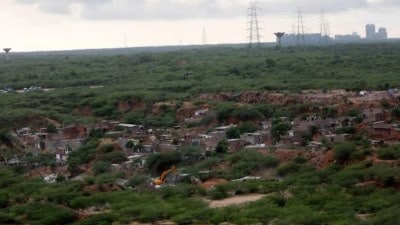Bombay HC paves way for man to get flat from MHADA, 48 years after his grandfather was evicted
Ravindra was made eligible for Permanent Alternate Accommodation (PAA) by Maharashtra Housing and Area Development Authority (MHADA) only in 2010 and the “long unbroken cry for long-delayed justice” continued for another 13 years.
 The HC disposed of the plea directing MHADA to give possession of the flat to the petitioner within 24 hours of the payment being made to the authority.
The HC disposed of the plea directing MHADA to give possession of the flat to the petitioner within 24 hours of the payment being made to the authority. Forty-eight years after his grandfather vacated the premises, the wait for Ravindra Gorakhnath Bhatuse and his family for the allotment of re-accommodation tenement in South Central Mumbai came to an end with a recent order of the Bombay High Court directing MHADA to allot the Permanent Alternate Accommodation (PAA) of 579 sqft to him.
Ravindra was made eligible for PAA by Maharashtra Housing and Area Development Authority (MHADA) only in 2010 and the “long unbroken cry for long-delayed justice” continued for another 13 years.
Not till February 2010, not the petitioner, not his father, but his grandfather, long deceased, long evicted, long banished from this city, was held eligible, the HC said.
The court asked the petitioner to pay for an additional 279 sqft area (since he was eligible for 300 sqft area) at the current market rate or ready reckoner rate, whichever is higher, within four weeks of the amount being communicated to him.
“We will be forgiven if we asked one question that stares us in the face: what kind of government and what kind of authority treats its own citizens like this?” a bench of Justices Gautam S Patel and Kamal R Khata said.
The HC in its order passed last week noted that it would be a “mild understatement to say that” it was “extremely disappointed in the approach of MHADA”.
Advocate Yashodeep Deshmukh told the bench that the notice was issued to original tenant Janu Shreepati Bhatuse, his client’s grandfather in November 26, 1975 to vacate a tenement at Zenab Manzil at Maulana Azad Road.
Later, a transit camp room at Antop Hill at Wadala was allotted to Janu, which became dilapidated, after which Janu was evicted for the second time. He returned to his village/hometown and could not see a new promised home in the city till his death in October, 2007. While Janu’s wife died two years later in August 2009, their only son Gorakhnath died in January 1996, leaving the petitioner and his mother Jayashree behind.
“One generation gone. The second generation is partly gone. There was no vestige of a re-accommodation being given,” the bench noted. The petitioner, in December, 2008, submitted documents seeking allotment of a tenement in a newly constructed building. It took another two years for him to become eligible for PAA.
The HC noted that from 2010 to 2023, “literally nothing happened on the part of MHADA causing ‘injustice’ to the petitioner”. Ravindra identified a tenement with an area of 579 sqft at Patel Wadi, Parel village. However, he could not avail the same, prompting Ravindra to approach the High Court.
MHADA, however, told the court that the flat concerned could not have been allotted as the petitioner was entitled to only 300 sqft while the tenement in question had 579 sqft area.
“We cannot understand why MHADA insists that the size of the apartment is determinative or why there is an apprehension expressed that ‘everybody will start demanding more’. The petitioner is not asking for this area free… The story of this family is by no means atypical but we see no reason why it should be perpetuated. Narratives such as these do not redound either to the credit of MHADA, the state government or, if such a submission by MHADA is accepted, to this court,” the bench noted.
“What the petition is really about is not real estate and not even a flat. It is one long unbroken cry for long-delayed justice… There has to be some moral imperative to the way in which matters of administration are addressed,” the bench noted, while granting relief to the petitioner.
The HC disposed of the plea directing MHADA to give possession of the flat to the petitioner within 24 hours of the payment being made to the authority.







